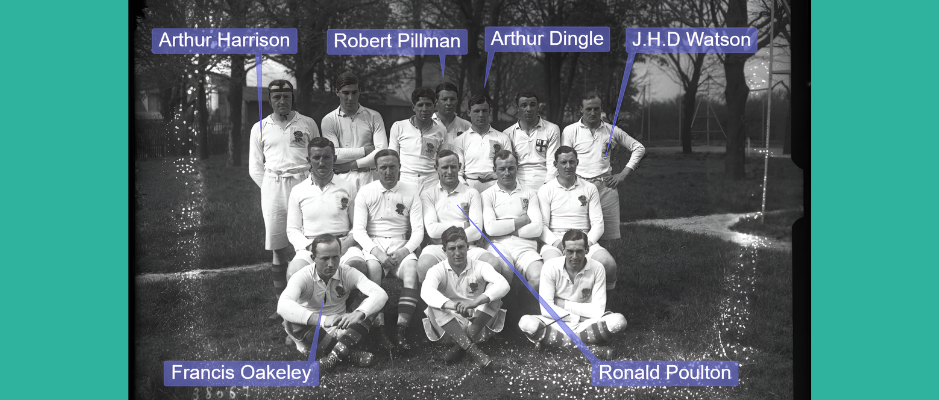Views
The last Five Nations before The Great War - Part One

The banner image above shows the England team that played France on April 13th 1914, the last Five Nations match before the Great War in which six of its members would die. Only one, captain Ronald Poulton, played in all four of that year’s matches yet, as volunteer Peter Bloor recounts in Part One of our series for this Remembrance period, his selection was by no means a certainty until his triumphant performance in England’s opening match against Wales.
In Part One of our series for this Remembrance period, volunteer Peter Bloor now looks at a puzzling trial match in the build-up to the tournament and at England’s first match against Wales.
“Marshal Foch unveils memorial”
Before the 1921 Five Nations match between France and England at the Stade de Colombes in Paris Marshal Foch unveiled a memorial to the French players who had been killed in the Great War. The England team laid a wreath and had their own players to remember, six of the team that had beaten France 39-13 at the same ground in April 1914 having also been killed in the war – Ronald Poulton, Francis Oakeley, Arthur Harrison, J.H.D. Watson, Arthur Dingle, and Robert Pillman. A seventh, Alfred Maynard, who played in the forwards against Wales, Ireland and Scotland but not against France, would also be killed.
“England wound up a most successful season…”
That win had been England’s fourth in the last pre-war Five Nations. Two had been by one point and defined by an individual performance – Poulton’s in the 10-9 win against Wales and Watson’s in the 16-15 win against Scotland playing at centre, the position from which Arthur Dingle had stepped aside – literally. Francis Oakeley and Arthur Harrison may not have defined the intervening match against Ireland but they had made sure that the Irish forwards had not done so either, as their reputation and their English counterparts’ performance against Wales had threatened.

January 1914, England 42 The Rest 27: “A puzzle for the selectors”
The final trial match played a fortnight before England’s first match of the Five Nations posed the selectors at least two puzzles to solve. The first was how to assemble a pack from England’s forwards, who had been superior in the loose, and from those of the Rest, who had been better in the scrum, with neither inclined to defend. The second was to decide upon the selection or previously inconceivable dropping of captain Ronald Poulton, who had repeatedly starved his wing Arthur Dingle by holding onto the ball for too long, one aspect of a performance that was far below his usual standard. Was this a complete loss of form that would be unjust to ignore given the impressive performance of, for example, J.H.D. Watson, as the Daily Express correspondent felt, or was he now “truly a case of fallen greatness” as Hamish Stuart wrote in the Daily Chronicle. The Wales match would show that the selectors would come up with the correct answer to the puzzle of Poulton but the wrong one to that of the forwards.
January 1914, England 10 Wales 9: “Beaten by fate…and Poulton”
They did select Poulton, possibly on his record rather than his performances as the Manchester Guardian suggested would happen, and he won the match for an England side whose forwards were dominated but not completely routed. The speed with which they broke up from the scrum was just one aspect of their brave defence, defence that was helped enormously by Poulton, who seemed to be everywhere yet somehow always in position while at the same time being just where he was needed, “shining in the brilliance of his game far above any man of either side on the field.”
Ronald applied his tactical acumen in attack too. Spotting that the Welsh weakness lay in the inexperience of their centres, William Watts and William Evans, whenever he was in possession of what ball his forwards had won - and what his struggling half-backs had got to him - he ignored Watson on his wing and ran at them, bemusing them with his swerves and opening the way for Bruno Brown to score England’s first try with three Welshmen clinging to him. With some 15 minutes to go and England behind Ronald began another of his runs. After “leaving a red line of floored Welshmen on the field” he passed to Brown, who followed his captain’s example by swerving through the centres before kicking for Cherry Pillman to score after the ball had twice bounced kindly for England. Fred Chapman converted and Wales were beaten, by Ronald Poulton and the bounce of the ball.
“To L.G. Brown and A.F. Maynard go the scanty laurels of the English forwards”
Wales had been so dominant in the forwards that they had only scrummaged with seven, leaving Tom Williams of Swansea with a roving commission to mark Cherry Pillman or scrum-half George Wood, a task he carried out at the very limit of the laws – and more than once beyond it. Two England forwards did nevertheless emerge with credit – the tenacious Bruno Brown and Alfred Maynard, who had shown resourcefulness and dash and shone in the loose – but even so, the selectors had not solved the forward puzzle posed by the England versus the Rest trial and changes were clearly needed for the next match against Ireland.
References
The quotes and other information in this article are taken from The Times, the Manchester Guardian, the Daily News, the Daily Chronicle, the Evening Standard, the Daily Express and other newspapers 1914 and 1921
Images: All Agence Rol, Source gallica.bnf.fr/Bibliothèque nationale de France
Comments: 0 (Add)
In this section
Volunteers
We’re always on the lookout for volunteers to help run our clubs all across England, Scotland and Wales – find out more here.
Find a club
Want to know where your nearest Sporting Memories club is? View our Club Finder page here.